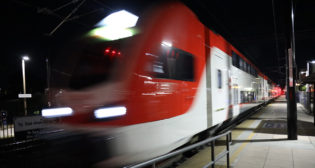
Amtrak: A Marx Brothers revival
Written by Frank N. Wilner, Capitol Hill Contributing Editor
Watching Washington, July 2018: When everybody owns something, nobody accepts accountability or responsibility. Such is the circumstance of Amtrak, a near-50-year-old orphan wandering in a public policy wilderness, dependent on grudgingly provided public assistance often provided with conditions and objectives so conflicted as to suggest a Marx Brothers comedy.
Although created as a “for-profit” corporation, Amtrak instead has absorbed some $41 billion in federal subsidies since its creation in 1971. In 1978, the policy deceit evident, Congress redirected Amtrak to be “operated and managed” as if it were a for-profit corporation.
An obedient Amtrak Board of Directors subsequently told Congress that Amtrak was on a “glide path” to operating self-sufficiency—but was contradicted by the Department of Transportation’s (DOT) Inspector General (IG), who identified growing losses and debt that had tripled.
Amtrak’s IG, who reports to Amtrak’s board and lacks the independence afforded the DOT IG, who is nominated by the President and confirmed by the Senate, was silent about the growing losses and tripling debt. Similarly, it was the U.S. General Accountability Office (GAO) that revealed allegations that the railroad’s chief engineer awarded a neighbor $2 million in “personal services consultant” fees. The Washington Post exposed a possible engineering flaw involving Acela Express trainsets. Shockingly, Amtrak’s internal controls remain scandalous two decades later, even though its IG has a $23 million budget.
Recently, Amtrak replaced full-service dining cars with cold-served meals-in-a box following a 2015 congressional directive to cease subsidizing food service—but Amtrak and its IG still ignore a 1997 congressional instruction to outsource food and beverage service to more-efficient private vendors.
As Amtrak does not use Generally Accepted Accounting Principles (GAAP), its financial reports are suspected as dodgy. Amtrak asserts its long-distance trains lose $500 million annually, yet they utilize infrastructure owned, maintained and renewed by host freight railroads to whom Amtrak pays relatively low user fees. Foggy is how Amtrak assigns joint and common costs among its diverse lines of business.
On the Northeast Corridor (NEC), Amtrak brags of dominating the air/rail market, ignoring bus operators that increasingly poach Amtrak passengers by offering lower fares, more frequent departures and competitive trip times.
Now simmering is Amtrak’s threat to annul long-distance trains hosted by freight railroads on routes where Positive Train Control (PTC) is not fully operational by a statutory installation interim deadline of Dec. 31. Critics allege an Amtrak ruse, as time-honored Federal Aviation Administration risk assessment procedures and FRA safety protocols govern non-PTC-compliant routes. Moreover, Amtrak makes no threat to halt service on the Amtrak-owned, dispatched and heavily congested NEC, where numerous segments are non-PTC-compliant.
What Amtrak President David Gunn lamented in 2005 remains spot-on: America lacks “a coherent plan for intercity passenger rail.” The current political climate chokes consensus-building on multi-modal infrastructure investments and is particularly unfriendly toward Amtrak. A recent Senate-confirmed addition to the Amtrak board is a former Republican congressman who twice voted to defund Amtrak.
There are private-sector alternatives that may bridge the philosophical gulf. For example, the NEC—owned by Amtrak under a 900-year, no interest, no-principal-payment mortgage—could be separated from Amtrak, which would become a train operating company, with NEC access opened for private sector competition.
One such proposal awaiting congressional hearings is AIRNet-21, whereby a private-sector management organization would lease the NEC and self-finance expansion and renewal, earning a profit through commercial development and assessment of statutorily established and federally regulated market-based user charges on passenger and commuter train operators.
Also, Congress could jump-start, perhaps with a tax incentive, a so-far unused provision of the 2015 Fixing America’s Surface Transportation (FAST) Act permitting private-sector operation of up to three Amtrak long-distance routes—a provision Amtrak allegedly is seeking to thwart by squeezing access to Chicago Union Station (Watching Washington, June 2018).
Amtrak reform requires unrelenting and transparent congressional involvement, not perpetuation of a status quo suggestive of the slumbering hotel management indifferent to malfeasance and misfeasance in the Marx Brothers slapstick comedy, Cocoanuts.



